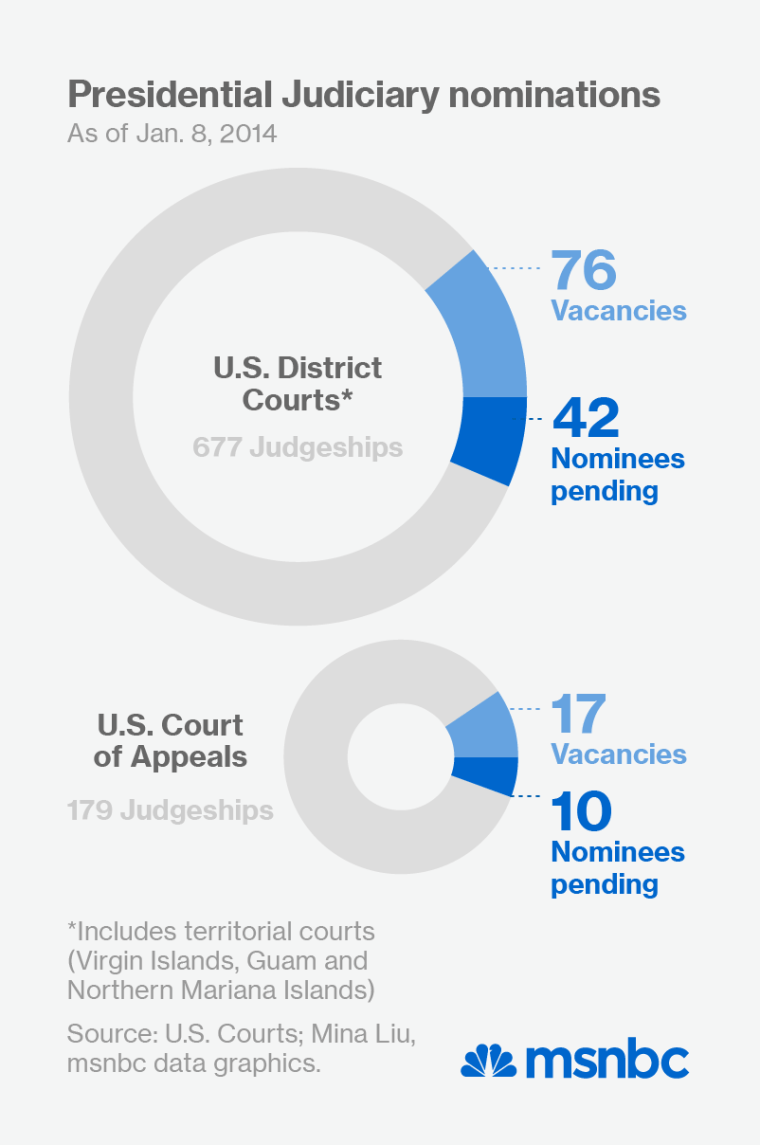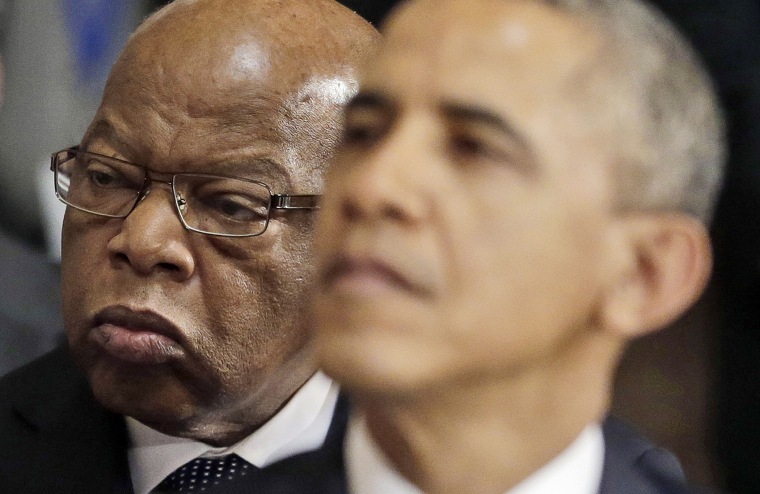President Barack Obama has a new set of opponents trying to block his judicial nominations: The civil rights activists who made it possible for him to make it to the White House in the first place.
"I'm sorry to have to oppose him on this issue, but a principle is involved here," said Rev. Joseph Lowery, one of the architects of the Montgomery Bus Boycott. "Long after President Obama will have retired from office, these judges will still be on the bench."

Three of the last living leaders of the civil rights movement -- including Lowery, Georgia Democratic Rep. John Lewis, and Rev. C.T. Vivian--are calling on Obama to withdraw his slate of judicial nominees for the federal bench in Georgia for being too conservative and for lacking diversity. Only one of the nominees, Eleanor Ross, who was appointed to the bench by Republican Gov. Nathan Deal, is black.
As msnbc reported in November, despite the demise of the filibuster, the arcane blue-slip process, through which nominees can be put forth only if they meet the approval of their home state senators, still allows Republicans to exercise significant influence over judicial nominees from behind the scenes. The White House is caught now between its liberal allies who want to see a more progressive judiciary, and Senate traditions that still leave Republicans with considerable influence over the administration's choices.
Two of the nominees activists are opposing are Michael Boggs and Mark H. Cohen. Boggs, currently a judge in Georgia, is a former state legislator who supported restrictions on access to abortion, voted to preserve the Confederate battle flag as part of the Georgia state flag, and backed a referendum that banned same-sex marriage in the state, according to The Daily Report. Cohen, once chief of staff to former Sen. Zell Miller, the conservative Democrat who angrily denounced his own party at the 2004 Republican convention, defended Georgia's voter ID law in court. Both men were among the dozens of judicial nominations the White House sent back to the Senate on Monday.
"Our view that this is a major opportunity to put forward more progressive nominees," Kyle Barry of the liberal Alliance for Justice says. "We should make this rule change worthwhile particularly ahead of the mid-term elections." If Republicans take back the Senate in November, then six years of Republican obstruction will have prevented the Obama administration from making a bigger mark on the federal courts, leaving a massive opportunity for a potential Republican successor.
The White House sent more than 50 nominations back to the Senate on Monday, but one was missing: William Thomas, an openly gay black judge whom Florida Republican Sen. Marco Rubio had initially supported, before withdrawing his backing and refusing to turn in his blue slip. That effectively ended Thomas' chances of making it to the bench.
The blue-slip process is managed at the discretion of the chair of the Senate Judiciary Committee, which is currently run by Vermont Democratic Sen. Patrick Leahy. Essentially, nominees are only put forth if Senators from a given state return a blue slip indicating their approval. Different chairs have put different levels of emphasis on the process, but Leahy has been fairly strict about respecting the prerogatives of his Republican colleagues--and he told msnbc in November that won't change unless he believes Senate Republicans are abusing it.
Yet if Republicans aren't abusing the process, the White House's clash with the Georgia delegation's Democrats shows they're certainly using it to their advantage. According to The Daily Report, Obama struck a deal months ago with Georgia's two Republican Senators to put forth a group of judicial nominees to the federal bench in that state. In September, five Democratic congressmen from Georgia--Reps. Lewis, David Scott, Hank Johnson, John Barrow, and Sanford Bishop -- wrote a letter to the White House expressing alarm over the nominees.
At a press conference just before Christmas held at Ebenezer Baptist Church, where Martin Luther King Jr. once preached, Scott said that "the President of the United States and the White House have made a terrible, tragic mistake." The White House is now under fire from both the Democratic congressmen from Georgia and veteran civil rights leaders, who are demanding to come to Washington, D.C. to testify against the nominees. As the Huffington Post reported, Lewis, Lowery and Vivian were awarded the Presidential Medal of Freedom by Obama himself. For those three men, who fought to pass the Voting Rights Act and lived to see one of its most important provisions gutted by the Supreme Court, who ends up on the federal bench now takes on an even larger significance.
Speaking on background, a White House official placed the blame on Republican senators taking advantage of the blue slip process and pointed out that Obama has nominated more women and minorities to the bench than any other previous president. The aide also said that the Georgia Democrats hadn't sought to influence the process until after the deal, which the aide said was the product of months of delicate negotiations, had already been struck. But the Georgia Democrats say that they were cut out of the process from the beginning.
There are more than 100 current or expected vacancies on the federal bench. Obama has put forth more than 50 nominees, but the blue-slip process means that Republicans can stall the process before the White House even makes its picks public. Most of the vacancies without nominees are in states with at least one Republican senator.
